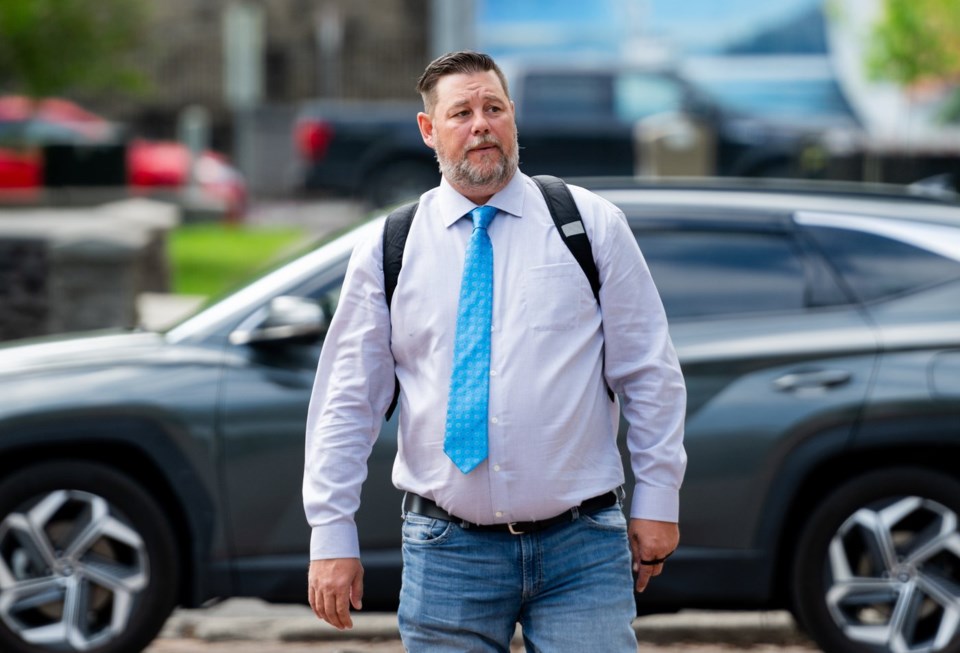OTTAWA — The defence for Freedom Convoy organizer Pat King is arguing that protesters were trapped within downtown Ottawa when police moved to end the three-week demonstration in 2022.
That February, Ottawa police warned protesters they would face charges if they didn't stop blocking streets, and King was one of those arrested during the operation.
He has pleaded not guilty to charges of mischief, counselling others to commit mischief, obstructing police and other offences.
King was a prominent figure in the convoy that gridlocked the area near Parliament Hill as part of a protest against public-health restrictions, COVID-19 vaccine mandates and the federal government.
His defence lawyer, Natasha Calvinho, began laying out her case in the Superior Court of Ontario on Wednesday.
She said all levels of government failed Ottawa residents with their response to the protests, and the blame for the disruptions it caused should not fall on King or anyone else who was "peacefully" protesting COVID-19 measures.
"The defence's evidence will establish that there was no mischief, there was no intimidation and there was no counselling to commit any criminal offence," Calvinho said in her opening remarks.
"My respectful suggestion is that you were only presented a fraction of the story."
Directly addressing Justice Charles Hackland, she asked him to consider that "context is key" when hearing all the evidence throughout the trial.
The defence is expected to call three Ottawa police officers to testify.
Calvinho suggested she expects them to provide evidence showing that protesters received mixed messages from police, and that officers could've done more to move the truckers.
King and other truckers were barricaded in, she argued, pointing to heavy equipment and cement dividers that police and city officials put around the downtown perimeter after the protest began in an area police referred to as "the red zone."
She told court that King was "not in control" of other protesters, whose trucks were parked on downtown streets, how they got there or why they did what they did.
When King's trial began in May, the Crown argued that King was an outspoken leader in the protest who wielded influence over the crowds as they blocked streets and blared air horns through all hours of the night and day.
The Crown is relying mainly on King's own videos, which he posted to social media throughout the protest to document the demonstration and communicate with protesters.
Following Calvinho's opening arguments on Wednesday, the defence called its first witness, Daniel Bulford.
The 42-year-old is a former RCMP officer whom Freedom Convoy organizers appointed as a security co-ordinator.
Bulford testified that early in the protest, police surrounded the downtown core with barricades, heavy equipment such as graders and other city vehicles in an attempt to prevent more trucks from getting near Parliament.
On Feb. 14, 2022, the federal government invoked the Emergencies Act for the first time since 1988, when it replaced the War Measures Act, giving police and banks extraordinary powers to freeze bank accounts and clear the protest.
As part of that operation, King and Bulford were separately arrested on Feb. 18.
Bulford ultimately wasn't charged.
He testified Wednesday that police had put up a lot of wire fencing in the area that closed off vehicle and pedestrian access, making it more difficult to leave.
He also said that during the early days of the demonstration, he had no idea who King was, and he believed the leaders of the Freedom Convoy movement were Tamara Lich and Chris Barber.
Lich and Barber were also arrested and charged for their role in the protest. Their criminal trial, which is taking place separately from King's, is set to continue next month.
The defence is expected to call more witnesses on Thursday and Friday before closing arguments are expected to begin early next week.
This report by The Canadian Press was first published July 17, 2024.
Mickey Djuric, The Canadian Press



